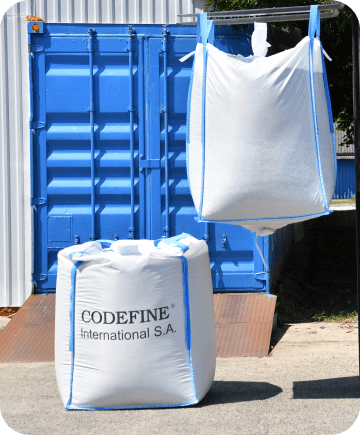Home » Posts Page » Blog » How Codefine’s Recycled Polypropylene FIBC Bags Support Sustainable Packaging

Flexible intermediate bulk containers (FIBCs) are some of the most popular types of industrial packaging on the planet. Favored for their strength, durability, and versatility, they serve a broad range of industry sectors and boast a wide variety of applications. However, polypropylene bags like FIBCs can come with a significant carbon footprint.
Polypropylene isn’t the easiest of plastics to recycle. However, by following a few key steps, repurposing used polypropylene into recycled plastic products such as woven PP bags is possible. Polypropylene doesn’t have to be separated from other plastics prior to collection, making collection relatively straightforward.
The next step toward recycled polypropylene is to separate the material from other materials and potential contaminants. Because of its low density compared to other polymers, sink-float separation is the preferred method for this. Next, polypropylene needs to be cleaned to remove persistent contaminants, as these can impede the overall process and limit potential uses of recycled plastic.
Once separated, polypropylene is then heated to high temperatures, eventually reaching its boiling point and turning into a liquid. After melting, the polypropylene is then rapidly cooled to form pellets. These pellets are then used to produce a range of plastic products, including eco-friendly packaging.
While PP recycling makes it possible to produce high-grade products like clothing fibers and bulk packaging, the recycling process does come with some limitations. Fortunately, sustainable FIBC bags are almost completely recyclable. Anything made from PP fibers can be recycled, although elements like labels and handles may need to be disposed of separately if they’re not made from polypropylene.
What’s more, the intended use of FIBC bags needs to be considered prior to recycling or reuse. Bags used to store and transport hazardous materials may not be suitable for recycling, for example. What’s more, any bags bound for the recycling process need to be used within a closed-loop system.
Since 1957, Codefine has been leading the way in sustainable and eco-friendly packaging. We strive to offer industrial solutions that use less new material, without compromising on quality. This results in a reduced carbon footprint and cost-savings that we can pass on to our customers.
What’s more, thanks to the Codefine Green Initiative, a culture of sustainability remains at the core of our business. We’re committed to developing innovative and eco-conscious packaging solutions and best practices, enhancing efficiency and reducing environmental impact.
At Codefine, you’ll find an extensive range of recycled polypropylene FIBC bags to choose from. Take your pick from a range of construction types, including U-shape, 4-panel, tubular, and double wall bags. Looking for specific bags for demanding applications? You’ll also find a selection of Type C, Type D, and flame retardant bags. If you’re looking to improve your green credentials and remove virgin PP from your supply chain, we offer a variety of PP bags made from up to 30% recycled polypropylene.
Recycled PP bags impress when it comes to durability and strength. Smaller PP bags boast safe working loads of 100 kg, while larger PP bags can comfortably accommodate working loads of up to 2,500 kg. What’s more, their woven construction and high-grade material make them resistant to tears, punctures, and everyday wear and tear in punishing conditions.
One of the many benefits of recycled polypropylene bags is that they can be used across a diverse range of industries, offering a reliable long-term storage solution and ideal for transporting large quantities of material.
One of the many benefits of recycled polypropylene bags is that they can be used across a diverse range of industries, offering a reliable long-term storage solution and ideal for transporting large quantities of material.
FIBCs can be used as construction bags, to store and transport feed and fertilizer in the agricultural sector, and to contain hazardous materials in the chemical and pharmaceutical manufacturing industries. Our FIBCs can be readily adapted to handle unique applications, with a variety of filling and discharging options available. Furthermore, our recycled FIBCs can be customized with your company name and logo, making your brand as visible as possible.

With Codefine FIBCs, you can be completely confident that you’re adhering to the latest compliance and regulations. Our UN-certified FIBCS meet strict safety standards for the storage and transportation of hazardous materials, while our chemical-safe bags meet ISO 22000 standards. Looking for food-safe FIBCs? Our packaging solutions are fully compliant with FSCC, FDA, and Global Food Safety Initiative (GFSI) requirements.
Concerned about supply chain sustainability? A truly sustainable supply chain is one that implements sustainable practices to protect the environment at every step. One of the simplest ways you can commit to sustainability is by embracing eco-friendly packaging. At Codefine, you’ll find a varied range of recycled PP products, with many FIBCs made from as much as 30% recycled material. Perfect if you’re looking to reduce your usage of virgin polypropylene, lower your carbon footprint, and enjoy significant cost savings along the way.
Eager to learn more about how Codefine can help you achieve your sustainability goals? Explore our full product range, including our recycled FIBC bags, online today. Need to speak about your requirements in more detail? Feel free to get in touch with your query.